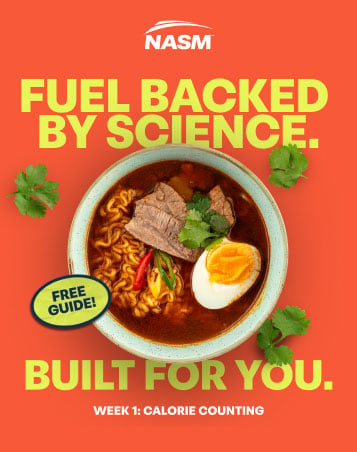What is one of the best choices you can make to nourish, protect and boost brain power? A simple and easy to implement answer to this question is to eat more unprocessed whole foods, which are naturally full of vitamins, minerals, antioxidants and phytochemicals. Read on to see what foods can help give our brain the extra boost it may need.
Studies show that people who eat more vegetables and fruits perform better on cognitive tests, while those who eat a lot of sugar and saturated fats are more likely to have some learning impairment. (Molteni, R., et al. 2002) (Ortega, R. M., et al. 1997)
Remember, when choosing foods, it is important to consider both calories (energy density) as well as the nutrients they contain (nutrient density). This eating strategy will help to support optimal physical and brain health.
Before you read, bookmark our NASM-CNC and Nutrition Courses pages to learn more great stuff about nutrition. You might even make a career out of it!
10 Brain Boosting Foods and Strategies
Omega 3 Fats
Kalmijn, S. V., et al. examined the associations of fatty acid and fish intake with cognitive function. They found that marine omega-3 polyunsaturated fatty acid (PUFA) (eicosapentaenoic acid and docosahexaenoic acid) consumption was inversely related to the risk of impaired overall cognitive function and speed. (Kalmijn, S. V., et al. 2004)
Consider consuming marine foods high in EPA and DHA throughout the week (e.g., salmon, mackerel and halibut).
Coffee/Caffeine
Caffeine is a plant alkaloid that physiologically acts to increase the excitability of the sympathetic nervous system. Higher lifetime coffee consumption has been associated with better (p ≤ 0.05) performance on cognitive function tests. An inverse and J-shaped association may exist between the number of cups of coffee consumed and cognitive decline, with the least cognitive decline for men consuming three cups of coffee per day. (Johnson-Kozlow, M., et al. 2002) (Van Gelder, B. M., et al. 2007)
Need another reason for a coffee break? Try to keep it to three!
Green Tea
Green tea has been purported to have a number of physical and cognitive health benefit. Evidence shows that green tea may possess potent activities of neuroprotection and amyloid precursor protein processing leading to cognitive enhancement. A higher consumption of green tea is associated with a lower prevalence of cognitive impairment. (Kuriyama, S., et al. 2006)
Enjoy an extra cup of green tea!
Carbohydrates
Glucose is the main metabolic fuel of the brain. The rate of glucose delivery from food to the bloodstream depends on the nature of carbohydrates in the diet, which can be classified as the glycaemic index (GI) and glycaemic load (GL). A low glycaemic breakfast has been shown to promote better cognitive performances later in the morning. (Benton, D., et al. 2003)
Try to focus on eating low GI and GL carbohydrates, such as vegetables, some fruits and unprocessed whole grains.
Blueberries
Blueberries contain polyphenolic compounds (anthocyanins) which have antioxidant and anti-inflammatory effects. Anthocyanins have been associated with increased neuronal signaling in brain centers, mediating memory function as well as improved glucose disposal. These benefits mitigate neurodegeneration. (Krikorian, R., et al. 2010).
Dark Chocolate
Cocoa and chocolate are a rich source of flavonoids, which have potent antioxidant and anti-inflammatory properties. Research has also shown favorable effects on neurocognition and behavior. The neurobiological actions of flavanols are believed to occur via the expression of neuroprotective and neuromodulatory proteins that promote neurogenesis, neuronal function, brain connectivity, blood-flow improvement and angiogenesis in the brain and sensory systems. (Sokolov, A. N., et al. 2013)
Add a dash of raw cacao to smoothies in the morning or in a hot drink.
Walnuts
Walnuts contain the n-3 fatty acids α-linolenic acid and linoleic acid, and are a rich dietary source of polyphenols, antioxidants and lipids. Walnut supplementation has been shown of have favorable effects on motor and cognitive ability. (Willis, L. M., et al. 2009)
Grab some blueberries and walnuts as part of your breakfast or a snack!
Turmeric (Curcumin)
Curcumin, from the curry spice turmeric, has been shown to possess potent antioxidant and anti-inflammatory properties and to reduce β-amyloid and plaque burden. Those who consumed curry “occasionally” and “often or very often” had significantly better Mini-Mental State Examination scores than did subjects who “never or rarely” consumed curry. (Ng, T. P., et al. 2006)
Add spice to your egg dish with a sprinkle of turmeric, or if curry is your thing, enjoy it with the added perk of knowing its health benefits.
Intermittent Fasting and Calorie Restriction
The vulnerability of the nervous system to aging often manifests in neurodegenerative disorders such as Alzheimer's and Parkinson's diseases. Caloric restriction (CR) and intermittent fasting (IF) can prolong the health-span of the nervous system via perturbations to fundamental metabolic and cellular signaling pathways that regulate aging. CR and IF affect energy and oxygen radical metabolism, and cellular stress response systems that protect neurons against genetic and environmental factors to which they are vulnerable to during aging. (Martin, B., et al. 2006)
Resistance Exercise
Aging is a dynamic and progressive process involving morphological, functional, hemodynamic, and psychological changes, all of which reduce one’s ability to adapt to the environment as well as increase vulnerability to pathological processes. The central nervous system and cognitive functioning also undergo changes with aging, such as neuronal loss, which results in a decline in cognitive performance. Cognitive functions most susceptible to senescence include attention, memory, and central executive functions. Many researchers have emphasized the role of moderate- and high-intensity resistance exercise programs on optimal physical and cognitive functioning. (Cassilhas, R. C., et al. 2007).
Make resistance training a part of your exercise routine.
References:
Benton, D., Ruffin, M. P., Lassel, T., Nabb, S., Messaoudi, M., Vinoy, S., ... & Lang, V. (2003). The delivery rate of dietary carbohydrates affects cognitive performance in both rats and humans. Psychopharmacology, 166(1), 86-90.
Cassilhas, R. C., Viana, V. A., Grassmann, V., Santos, R. T., Santos, R. F., Tufik, S. E. R. G. I. O., & Mello, M. T. (2007). The impact of resistance exercise on the cognitive function of the elderly. Medicine and Science in Sports and Exercise, 39(8), 1401.
Johnson-Kozlow, M., Kritz-Silverstein, D., Barrett-Connor, E., & Morton, D. (2002). Coffee consumption and cognitive function among older adults. American Journal of Epidemiology, 156(9), 842-850.
Kalmijn, S. V., Van Boxtel, M. P. J., Ocke, M., Verschuren, W. M. M., Kromhout, D., & Launer, L. J. (2004). Dietary intake of fatty acids and fish in relation to cognitive performance at middle age. Neurology, 62(2), 275-280.
Kuriyama, S., Hozawa, A., Ohmori, K., Shimazu, T., Matsui, T., Ebihara, S., ... & Tsuji, I. (2006). Green tea consumption and cognitive function: a cross-sectional study from the Tsurugaya Project. The American Journal of Clinical Nutrition, 83(2), 355-361.
Krikorian, R., Shidler, M. D., Nash, T. A., Kalt, W., Vinqvist-Tymchuk, M. R., Shukitt-Hale, B., & Joseph, J. A. (2010). Blueberry Supplementation Improves Memory in Older Adults†. Journal of Agricultural and Food Chemistry, 58(7), 3996-4000.
Martin, B., Mattson, M. P., & Maudsley, S. (2006). Caloric restriction and intermittent fasting: two potential diets for successful brain aging. Ageing Research Reviews, 5(3), 332-353.
Molteni, R., Barnard, R. J., Ying, Z., Roberts, C. K., & Gomez-Pinilla, F. (2002). A high-fat, refined sugar diet reduces hippocampal brain-derived neurotrophic factor, neuronal plasticity, and learning. Neuroscience, 112(4), 803-814.
Ng, T. P., Chiam, P. C., Lee, T., Chua, H. C., Lim, L., & Kua, E. H. (2006). Curry consumption and cognitive function in the elderly. American Journal of Epidemiology, 164(9), 898-906.
Ortega, R. M., Requejo, A. M., Andrés, P., López-Sobaler, A. M., Quintas, M. E., Redondo, M. R., ... & Rivas, T. (1997). Dietary intake and cognitive function in a group of elderly people. The American Journal of Clinical Nutrition, 66(4), 803-809.
Sokolov, A. N., Pavlova, M. A., Klosterhalfen, S., & Enck, P. (2013). Chocolate and the brain: neurobiological impact of cocoa flavanols on cognition and behavior. Neuroscience & Biobehavioral Reviews, 37(10), 2445-2453.
Van Gelder, B. M., Buijsse, B., Tijhuis, M., Kalmijn, S., Giampaoli, S., Nissinen, A., & Kromhout, D. (2007). Coffee consumption is inversely associated with cognitive decline in elderly European men: the FINE Study. European Journal of Clinical Nutrition, 61(2), 226-232.
Willis, L. M., Shukitt-Hale, B., Cheng, V., & Joseph, J. A. (2009). Dose-dependent effects of walnuts on motor and cognitive function in aged rats. British Journal of Nutrition, 101(08), 1140-1144.
















